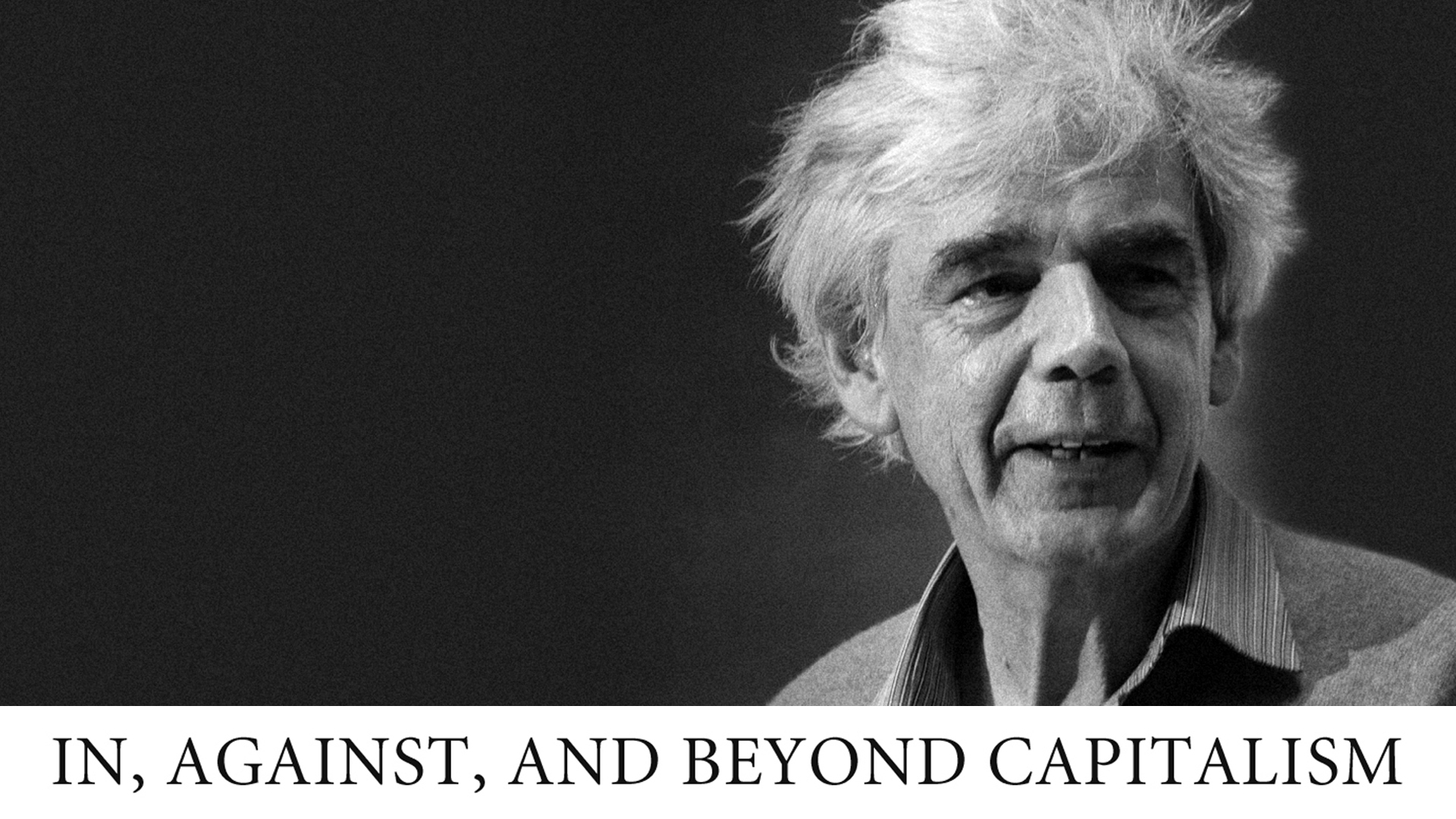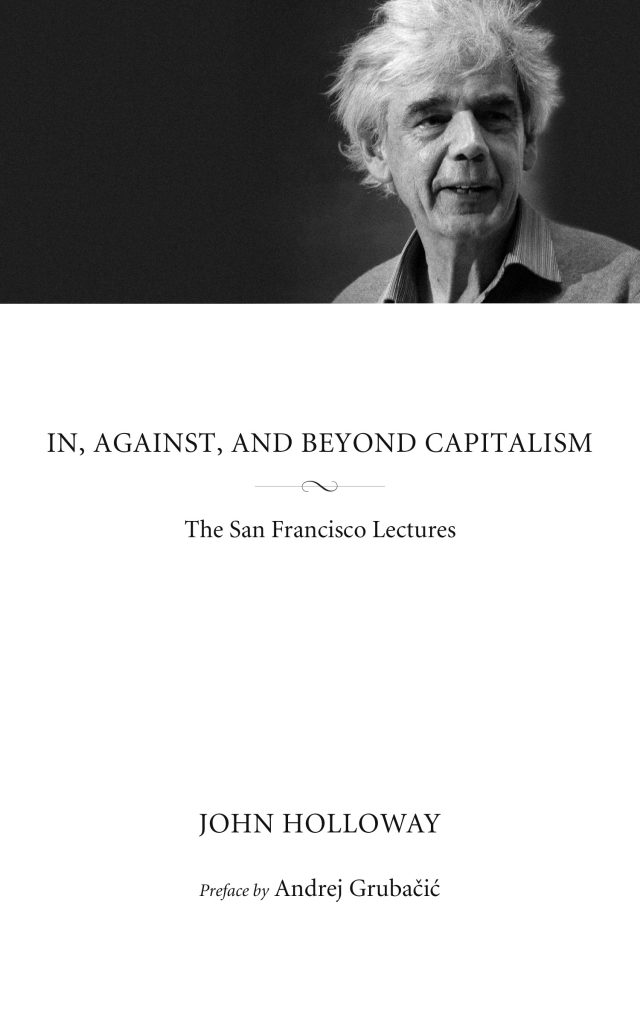By Stella Darby
Antipode
June 2016
My own nervousness about reviewing this short book of John Holloway’s talks matched my pleasure in being asked to do it. It felt daunting to publish my first-ever review piece on the work of a favourite author and teacher. Thankfully the book’s short, digestible format makes it easy to enjoy, and its content leaves as much space for critical engagement as it creates for hope and inspiration.
In Against, and Beyond Capitalism comprises three lectures–collectively titled “After Capitalism”–given by Holloway at the California Institute of Integral Studies on three consecutive days in April 2013. Andrej Grubačić’s preface introduces key theories and theorists influencing Holloway’s thinking. I initially wondered if diving straight in with negative dialectics, post-1968 Marxism, Italian autonomists, and state derivationism could be off-putting for the reader who (like me) feels intimidated by much of Leftist intellectual philosophy. However, this preface carefully highlights relevant terms and authors, situating the more accessible talks which follow within a helpful and concise theoretical context.
A short bibliographic note from Holloway closes the book with further thoughts on historical influences and current context. Between these book-ends, transcriptions of Holloway’s three talks–complete with audience questions and discussion–allow us to follow a journey which begins with “We” and urges us to carry a flag of hopeful defiance with its concluding message: “We are the crisis of capital, and proud of it!”
In his first talk, “Who Are We?”, Holloway discusses what he means by “We”. The non-identitarian stance he lays out here continues to be reinforced throughout the book.
Holloway’s “We” is not defined by characteristics or classifications, which–including the often-idealized proletarian identity–ultimately separate us from each other. Instead it points to dignity as an inclusive and connecting basic desire. As such, this concept of “We” places the power with people’s humanness, and with our ability to recognise others’ shared desires for dignity. It flips on its head the notion that we who dislike capitalism are all powerless victims of hegemonic neoliberalism: we are neither victims nor powerless, because capitalism’s functioning depends on our participation.
By reminding us that we all actively create capitalism, Holloway opens a space for us, whoever “We” may be at any given time, to contemplate how we’d like to do things differently. However, he never tells us what “doing things differently” ought to look like.
Multiple admiring references to the Zapatistas in Chiapas, Mexico, are accompanied by the caveat, “We must start where we are.” But Holloway’s foundational principle–that “We” ordinary people have the power upon which capitalism depends–establishes a theoretical imperative for conscious, collective discussion and choice-making about how we want to organise ourselves, and why.
The second talk, titled “Capital: The Social Cohesion That Strangles Us”, puts a visceral focus on capitalism–not as an immovable system but as a fluid way of relating to each other. We are not nouns, but verbs, says Holloway–constantly in movement. Yet through capitalism, we choose to relate to each other through objectified things that we produce with our labour. As Marx has shown, to do this we need to fix arbitrary, static value to objects and services–thus separating our creations and creativity from the human “doing” behind them. This focus on capital as a set of social relations highlights what’s so un-dignifying about it, what makes us angry, ill, dejected. Stuffing our time, energy and creativity into the box of monetary value–which has to push us ever harder to sustain its edge–simply hurts. We might respond with anger, sickness or withdrawal…all while continuing, understandably, to try and counteract these ills through the same processes of labouring and consuming that we are accustomed to, thus recreating these damaging relations day by day. And yet, alongside all of this, we are constantly creating “cracks”–taking action in small and large ways not driven by money but rather by care, creativity, dignity, love, anger, fun.
As in earlier books, Holloway steers straight for the rage and pain created by the twisted social relations of capital and, in touching this collective wound, opens us up to the possibility of doing things differently. At the same time, this emphasizes the capacity which already exists–in the cracks–for doing things in ways which affirm dignity and value life.
Revolution, for Holloway, means the expansion and multiplication of these cracks. It’s not so much a call to action as a call to connection, or re-connection: a call to relate to each other as the dignified humans we know we are, rather than as producers of stuff.
The third and final talk builds on the premises of collective dignity and suffocating capitalist social relations to convince us that capitalism is as vulnerable to us as we are to it.
Capitalism’s fluidity, its constant need to make monetary value keep pace with shifting human needs and wants and ingenuity, means that it must always demand more from labourers. Instead of seeing the repeated crises of capitalism as failures of those in power, Holloway invites us to see this as the failure and/or refusal of workers to effectively submit to domination. He recognises implicit “nonsubordination” as equally significant to overt anti-capitalism: perhaps workers express direct anger, or perhaps they simply drag their feet, or get physically or mentally ill–in any case, the productivity that capital depends upon is diminished. From this point of view, Holloway points out, demanding better regulation of banks and full employment is akin to saying “let’s put other bankers, other capitalists
…ones who are more competent, who can really dominate us effectively” (p.55). So, we can choose victimhood, demanding that capital be shored up by state power so it can function more effectively at exploiting us, or we can embrace our collective power as the stick in the wheels of capitalism and decide that we want to do things differently.
And yet…we may well feel stuck between wanting to create alternatives and also needing to make a living. Just as he refutes the idea of revolutionary purity, Holloway acknowledges that it’s “probably best to actually recognize that we are caught in this contradictory situation” (p.65). How do we then “start from where we are”? By “hoisting a flag”, Holloway urges us–and by talking together about how we want to start walking away from capitalism and where we want to go, a little at a time, and proudly. Hence the title of this last talk: “We Are the Crisis of Capital and Proud of It.”
As was the case at talks I’ve attended by John Holloway, some of the questions transcribed in this book exasperatedly ask, “But John, what should we actually do?!” Others query the particularities of a given situation. Holloway almost always evades giving direct answers to such questions. Despite the numerous references to Chiapas, he reminds us that there’s no point wishing we were Zapatistas; we must respond to our own contexts. Indeed, strategies and shared values need to be discussed by the people enacting them, not devised intellectually–not least because they need to be fluid and practical. Crucially, the philosophy presented here entrusts the particularities of a site of resistance to those engaged in it.
Specific recommendations would almost seem out of line with Holloway’s own theory. However, it would not hurt to explicitly encourage conversations about not just dignity but specific shared values: a given group of people must discuss what these are for them; why they are important; how they can be put into practice. If “We” is the theoretical and intellectual starting point for social relations of dignity, such conversations must be the practical one for many of the “cracks” Holloway wishes to promote.
Holloway is similar to many anti-capitalist theorists in eluding requests for advice, blueprints and fully-formed alternative models. Unlike others, however, his work does not seek to shock us into the awareness that something is wrong or to illuminate the problem with revelations of new technicalities. Neither does it present an analysis which requires resistance to subscribe to a particular interpretation of the problem in order for it to “count”.
Holloway’s approach assumes, rightly, that we are already deeply aware of a problem–and seeks instead to elaborate a framework of thinking which helps us articulate that sense of wrongness and reaffirm the dignity and possibilities inherent in our very awareness of it.
Such affirmation empowers and reclaims a diverse set of responses and alternatives to capitalism.
Like
a good therapist, Holloway raises more questions than he answers and
offers few concrete instructions. He sends us back “out to the
street…to see the rebellion inside people”(p.9), comforted by a sense
of shared human experience and by the reminder that, no, we are not
crazy. If our spirits balk at the everyday exploitation and abstract
valuation that appear to define our survival, thank goodness, Holloway
suggests–this means we are still alive, still human. In a society where
even anti-capitalist activism often defines its success by constant
linear progress in ever-more-urgent circumstances, Holloway’s thinking
affirms the value of life–which rarely hurries down defined, linear
trajectories. He invites us to “ask as we walk”, not as we run, and his
words convey a calm, poetical slowness. As long as we keep moving at a
pace guided by our dignity, there is hope of cracking the dynamic of
capital, right where we are, right now.
Back to John Holloway’s Author Page | Back to Andrej Grubacic’s Author Page







